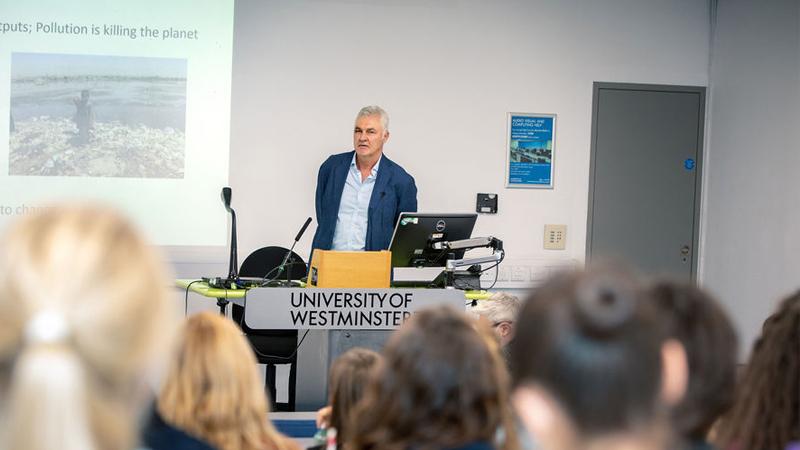The University of Westminster hosted a Westminster Sustainability Day conference as part of the University’s commitment to the 17 Sustainable Development Goals (SDGs) and address the climate crisis on 29 October at Marylebone Campus.

Throughout the day, attendees met with innovative companies and start-ups who are putting sustainability at the centre of their business models, who held a variety of talks and roundtables to stimulate discussion and address the climate crisis.
Three themes were discussed throughout the conference; ‘Creating a sustainable company’, ‘The future of capitalism is the circular economy’; and ‘Carbon Zero: When, how and maybe?’.
During the talk about how to create a sustainable company, attendees learned about the dos, don’ts and difficulties of achieving this. Aisha Stenning, Global Sustainability Manager at Unilever, also presented Unilever’s efforts to reduce plastic in their packaging, the amount of recycled plastic they use and their further sustainability efforts.
Nikki Kapp from the Ellen MacArthur Foundation discussed the future of capitalism and the circular economy, and discussed how reducing the use of natural resources also reduces carbon footprints and energy inputs.
Tom Heap, Rural Affairs Correspondent for BBC News and host of ’39 Ways to Save the Planet’ on BBC Radio 4 also joined the conference, where he spoke about Carbon Zero and how society might achieve it. Becky Gordon unveiled Interface’s new carbon negative carpet tiles. The session on carbo zero finished with participants discussing the merits of carbon offsetting and whether this was a necessary evil in the short term. Carbon offsetting may be necessary to reduce the amount of CO2 in the atmosphere, but also a way for companies and consumers to avoid making difficult decisions and modifying their processes, products and lifestyles.
Throughout 2020 and 2021, the University of Westminster has accelerated its efforts to work collaboratively across the University on inclusion, sustainability, and social responsibility. Despite challenges from a year of working and studying remotely, Westminster has continued to add value to society and internal and external communities through research, learning, and teaching. Key examples include the development of new programmes in response to global environmental, social, and economic challenges, tackling Climate Change, championing to reduce inequalities and supporting the mental and physical well-being of students and colleagues.
Talking about the conference, Dr Martin Mathews, Senior Lecturer and Course Leader for the Sustainability Management and Innovation MSc course, said: “The conference gave students the opportunity to hear front the front line of sustainability and see how companies are reducing their environmental footprint.”
Find out more about Sustainability Month at the University of Westminster.


